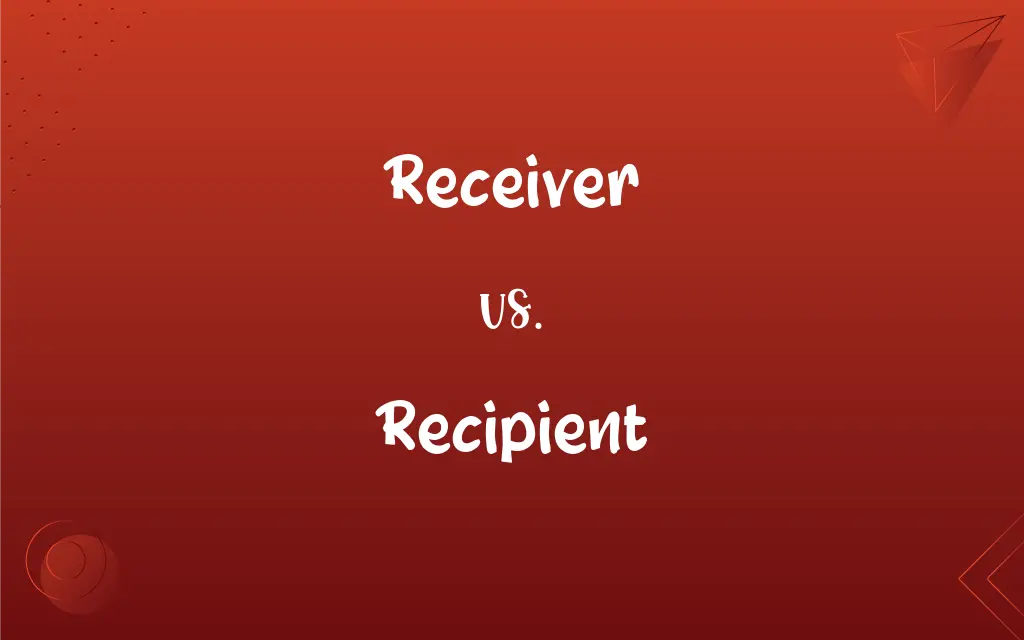Receiver vs. Recipient: What's the Difference?
Edited by Aimie Carlson || By Janet White || Published on November 28, 2023
A receiver is one who receives something, often in a broader context, while a recipient is specifically someone who receives an item, award, or message.

Key Differences
The term "receiver" generally refers to someone who receives anything, from a communication to an object. "Recipient," however, is often used more specifically for someone who receives a particular item, service, or communication.
"Receiver" can also denote a role or function in technical and legal contexts, such as in telecommunications or bankruptcy cases. "Recipient" is more commonly used in personal and formal contexts, like receiving mail, awards, or benefits.
In communications, a receiver is the party who gets the message, regardless of the medium. A recipient is more specifically the end target of a message, gift, or award, emphasizing the act of receiving something intended for them.
A receiver can be a person or a device in a technical system (like a telephone receiver). A recipient is always an entity (person or group) designated to receive something specific, like a donation or a
The use of "receiver" is more versatile and can be applied in various contexts, while "recipient" is used in contexts where the focus is on the act of receiving something particular or official.
ADVERTISEMENT
Comparison Chart
Definition
One who receives anything in a general or specific context
Specifically someone who receives an item, message, or award
Contexts
Broader, including technical and legal
Personal, formal, often involving specific items or communications
Usage
Versatile in various contexts
Focused on the act of receiving something specific
Examples
Person in a conversation, device in a technical system
Awardee, mail recipient, scholarship recipient
Implication
Receiving in general, may involve active participation
Target of a specific act of giving or awarding
ADVERTISEMENT
Receiver and Recipient Definitions
Receiver
A party in legal terms who is appointed in bankruptcy cases.
The court-appointed receiver managed the company's assets.
Recipient
An individual who is granted a scholarship or benefit.
As a scholarship recipient, he was able to attend university.
Receiver
A component in electronic devices that receives signals.
The radio's receiver was tuned to a local station.
Recipient
A person who receives a specific item, award, or message.
The recipient of the prestigious award gave an inspiring speech.
Receiver
An individual who gets something, in general.
She was the receiver of numerous accolades in her career.
Recipient
Someone who is given a gift or donation.
The charity's recipients benefited greatly from the donations.
Receiver
A person or device that gets or intercepts something.
The receiver of the phone call quickly noted down the message.
Recipient
The designated addressee of mail or parcels.
The recipient was delighted to receive the unexpected package.
Receiver
The end point in a communication process.
The receiver of the email responded promptly.
Recipient
The target of a specific act of communication.
She was the intended recipient of the confidential report.
Receiver
One that receives something:a receiver of many compliments.
Recipient
One that receives or is given something
Recipients of the award.
Receiver
A device, such as a part of a radio, television set, or telephone, that converts incoming electromagnetic signals into sound, light, or electrical signals.
Recipient
One who receives blood, tissue, or an organ from a donor.
Receiver
A person appointed by a court to receive and responsibly administer funds or property connected with ongoing litigation.
FAQs
What is a legal receiver?
A person appointed to manage assets in legal cases like bankruptcy.
Who is a recipient?
An individual or entity specifically targeted to receive something.
In what context is "recipient" most often used?
For receiving mail, awards, benefits, or specific messages.
Is "recipient" used in legal contexts?
Less commonly, it's more for personal or formal situations.
Can "receiver" be used in sports?
Yes, in sports like American football, referring to the player catching the ball.
Can organizations be recipients?
Yes, such as charities receiving donations.
Is "recipient" used for electronic devices?
Typically not, it's used for people or organizations.
What is a receiver?
Someone who receives something, either as a person or in a specific role.
Can "receiver" refer to a device?
Yes, in contexts like electronics or telecommunications.
Are the terms interchangeable?
In some contexts, but they have distinct nuances.
What's an example of a receiver in technology?
The part of a phone or radio that receives audio signals.
What role does a receiver play in a conversation?
They listen or read and interpret the message.
Do receivers always actively participate?
In communication, yes, but not always in other contexts.
What's a common use of "recipient"?
Referring to someone receiving an award or scholarship.
Can a recipient be involuntary?
Yes, like someone receiving unsolicited mail.
Is a mailbox a receiver or recipient?
Technically a receiver, as it's a device.
Is a recipient always aware of receiving something?
Generally, especially in contexts like awards or communications.
How is "receiver" used in communication theory?
As the party receiving a message or signal.
Who can be a recipient of a grant?
Individuals, non-profits, or educational institutions.
Can "recipient" refer to email communication?
Yes, the person receiving the email.
About Author
Written by
Janet WhiteJanet White has been an esteemed writer and blogger for Difference Wiki. Holding a Master's degree in Science and Medical Journalism from the prestigious Boston University, she has consistently demonstrated her expertise and passion for her field. When she's not immersed in her work, Janet relishes her time exercising, delving into a good book, and cherishing moments with friends and family.
Edited by
Aimie CarlsonAimie Carlson, holding a master's degree in English literature, is a fervent English language enthusiast. She lends her writing talents to Difference Wiki, a prominent website that specializes in comparisons, offering readers insightful analyses that both captivate and inform.






































































